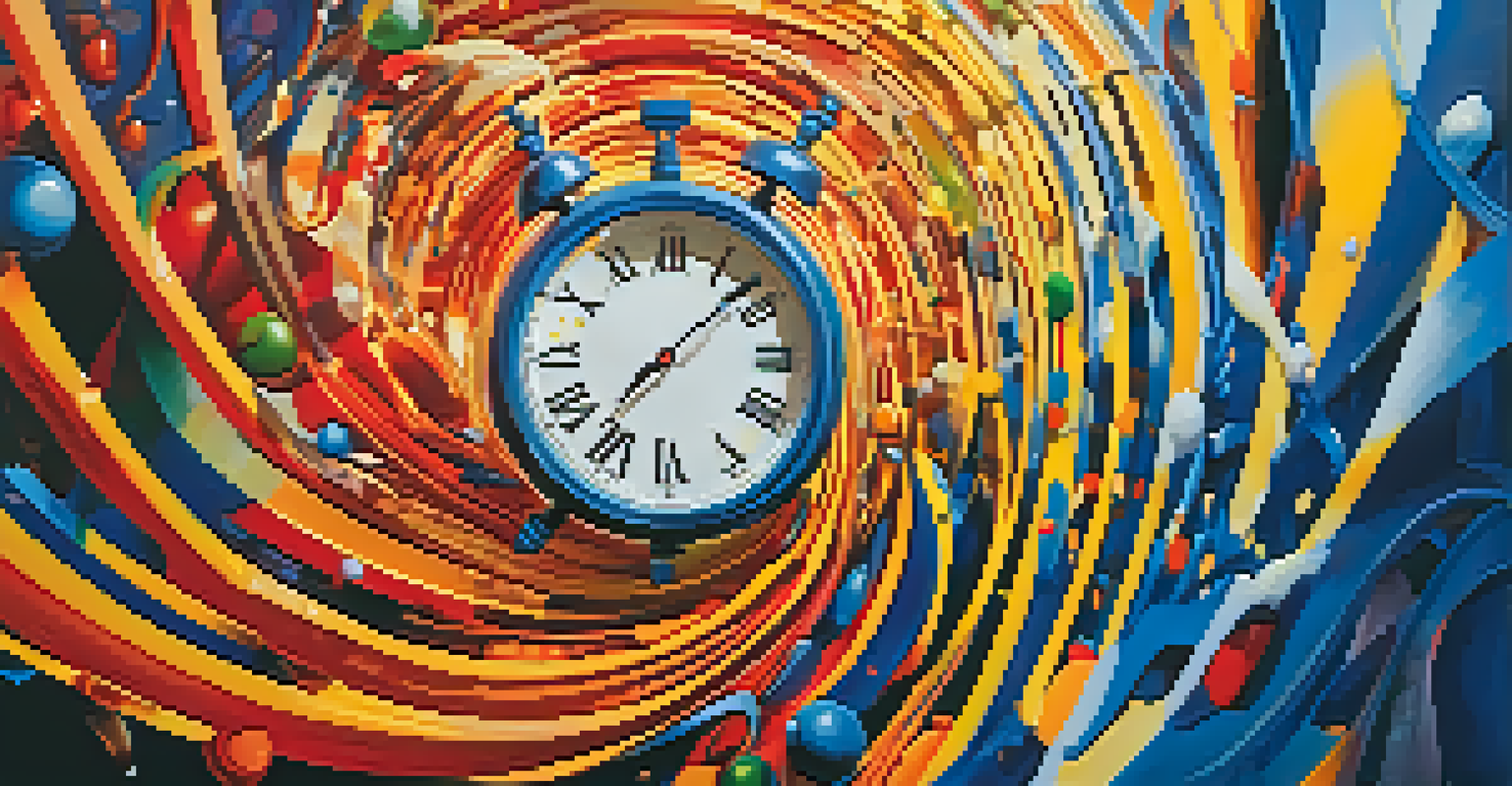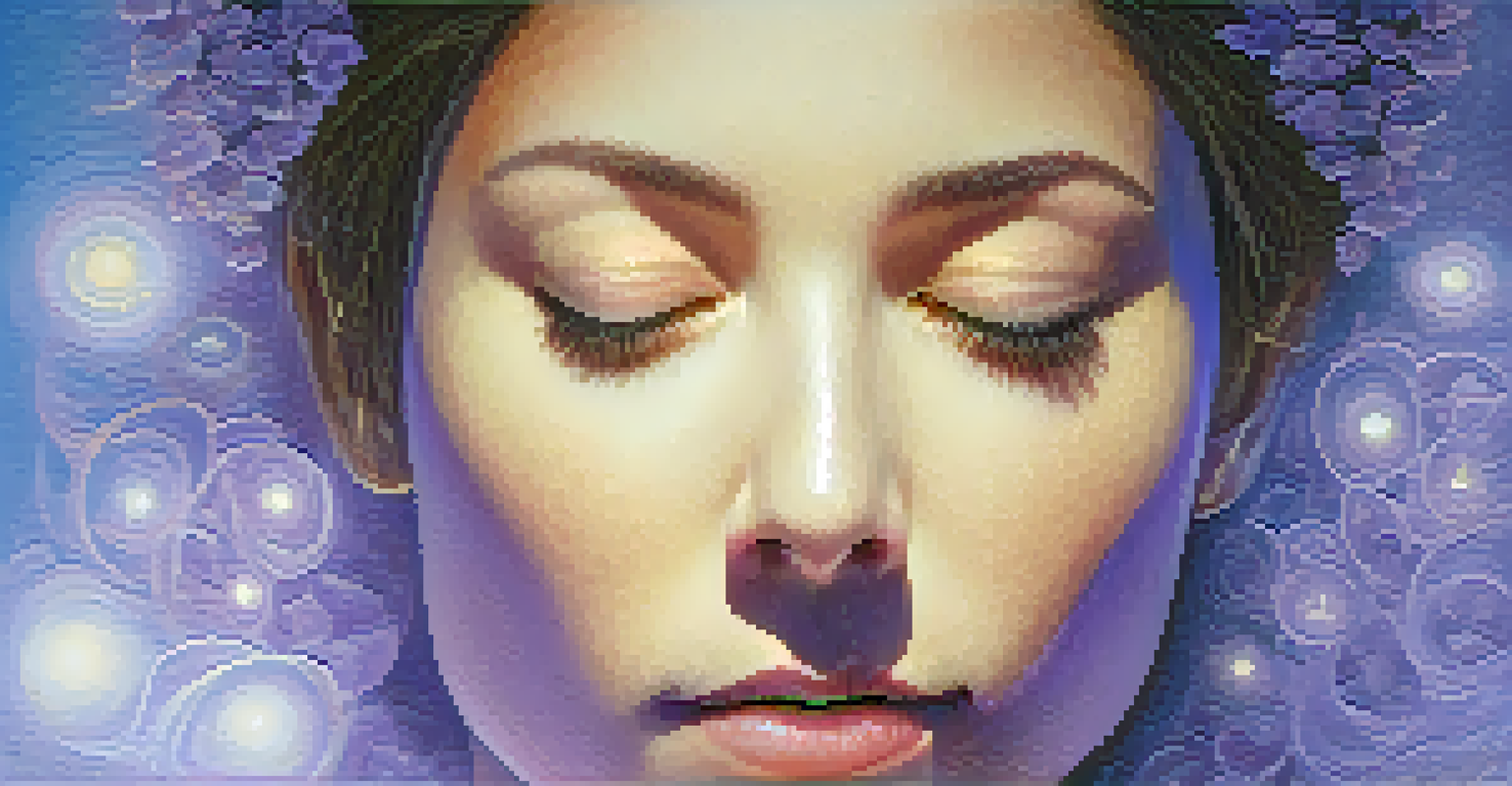Altered Time Perception: Hallucinogens and Human Experience

Understanding Altered Time Perception
Altered time perception refers to how our minds can experience time differently. This phenomenon can occur in various states, including during intense meditation, sleep deprivation, or while under the influence of hallucinogens. People often report time feeling stretched, compressed, or even entirely distorted during these experiences.
Time does not exist. It is a construct of our minds.
When engaging with hallucinogens like LSD or psilocybin, users frequently describe feeling as though time is moving at a snail's pace or speeding up. The brain processes sensory information differently in these states, leading to a reconfiguration of how we perceive time. This can create a sense of timelessness or an overwhelming feeling of the present moment.
Moreover, altered time perception can have profound implications on an individual's experience of reality. It can lead to deeper introspection, creativity, and emotional insights, as people reflect on their thoughts and feelings in ways they may not normally do. Understanding this phenomenon helps us appreciate the complex relationship between consciousness and time.
The Science Behind Hallucinogens
Hallucinogens primarily affect serotonin receptors in the brain, particularly the 5-HT2A receptor. This interaction can lead to changes in mood, perception, and cognition, resulting in the altered experiences users report. By influencing neural circuits, these substances can create vivid hallucinations and a distorted sense of time.

Research indicates that when these receptors are activated, the brain's default mode network (DMN) becomes highly active. The DMN is associated with self-referential thoughts and daydreaming, which may explain why time seems to stretch or contract. The interplay between these networks may lead to a sense of merging with the environment, further distorting time perception.
Altered Time Perception Explained
Altered time perception occurs during experiences like meditation and hallucinogens, leading to feelings of timelessness and distorted reality.
Understanding the neuroscience behind these experiences can demystify why users feel as though they are transcending time. This scientific perspective can also promote a more nuanced conversation about the potential therapeutic applications of hallucinogens in treating conditions like anxiety and depression.
Cultural Perspectives on Hallucinogenic Experiences
Throughout history, various cultures have used hallucinogens in spiritual and religious ceremonies. Indigenous tribes, for instance, have employed substances like peyote and ayahuasca to facilitate profound experiences that often include altered time perception. These practices illustrate how time can be viewed differently across cultures and the role it plays in spiritual journeys.
The mind is everything. What you think you become.
In many of these contexts, altered time perception is not just a side effect but a crucial part of the experience. Participants often report significant insights gained during these extended moments of introspection, which can lead to personal and communal healing. This cultural understanding of time can reshape how we view our own experiences with hallucinogens.
By examining these cultural practices, we gain insight into how different societies interpret and value altered time perception. It encourages us to reflect on our relationships with time and the experiences we might be missing in our fast-paced modern lives.
Personal Accounts of Altered Time Perception
Many individuals who have experimented with hallucinogens share strikingly similar accounts of altered time perception. For instance, some describe moments during their experience where they felt like they had lived entire lifetimes in the span of just a few minutes. These anecdotes highlight the profound impact that hallucinogens can have on our sense of temporal reality.
One common theme is the feeling of being 'in the moment,' where everything seems to expand and contract simultaneously. This sensation can lead to feelings of euphoria, dread, or transformative insight, depending on the individual's mindset and environment. Such accounts emphasize the subjective nature of time and how personal experiences shape our understanding of reality.
Neuroscience of Hallucinogens
Hallucinogens primarily affect serotonin receptors, influencing mood and cognition, which can lead to significant changes in time perception.
These stories also underline the importance of context in hallucinogenic experiences. The setting, the company one keeps, and the mental state before ingestion can all influence how time is perceived. Personal narratives add depth to our understanding of altered time perception, showcasing its complexity and variability.
The Therapeutic Potential of Altered Time Perception
Research into hallucinogens' therapeutic potential has grown, particularly in the treatment of mental health disorders. Studies have shown that substances like psilocybin can help individuals confront difficult emotions and memories, often accompanied by altered time perception. This can lead to significant breakthroughs in therapy, making it a focus of modern psychological research.
Therapists have noted that when patients experience time differently, they can gain new perspectives on their issues. For instance, a traumatic memory may feel less immediate or painful, allowing for deeper exploration and healing. Such therapeutic sessions can create a safe space for individuals to navigate their emotions and experiences without the usual constraints of time.
As society continues to explore the boundaries of mental health treatment, understanding the role of altered time perception can be crucial. It opens up new possibilities for healing and self-discovery, allowing individuals to break free from the usual narratives that often bind them.
Challenges and Risks Associated with Hallucinogens
While hallucinogens offer fascinating insights into altered time perception, they also come with challenges and risks. Not everyone reacts positively to these substances; some may experience anxiety, paranoia, or disorientation. These negative experiences can be exacerbated by the disorienting effects on time, leading to feelings of being overwhelmed or lost.
Moreover, the setting in which hallucinogens are consumed plays a significant role in shaping the experience. An uncomfortable or unsafe environment can lead to distressing trips, as users may feel trapped in a distorted perception of time. It’s crucial for individuals to approach these substances with caution and respect, ensuring they are in a supportive and safe context.
Therapeutic Uses of Time Perception
Understanding altered time perception is crucial for exploring the therapeutic potential of hallucinogens in mental health treatments.
Understanding these risks is essential for those considering hallucinogenic experiences. By fostering a responsible approach and being aware of potential challenges, individuals can better navigate their journeys and harness the positive aspects of altered time perception.
Conclusion: The Intrigue of Time and Consciousness
Altered time perception through hallucinogens offers a unique lens into the nature of consciousness and reality. By diving into this topic, we uncover not just the mechanics of time but also how our minds can reshape our understanding of existence itself. This exploration invites us to rethink our relationship with time and the experiences that define us.
As research continues, we may find new ways to integrate the insights gained from these experiences into our daily lives. Whether for therapeutic purposes or personal exploration, the interplay between hallucinogens and time perception holds great promise. It encourages a dialogue around mental health, spirituality, and the human experience.

Ultimately, the journey through altered time perception is a reminder of the fluidity of our existence. It invites us to embrace the present moment, recognize the richness of our experiences, and understand that our connection to time is as much a part of our consciousness as any thought or feeling.